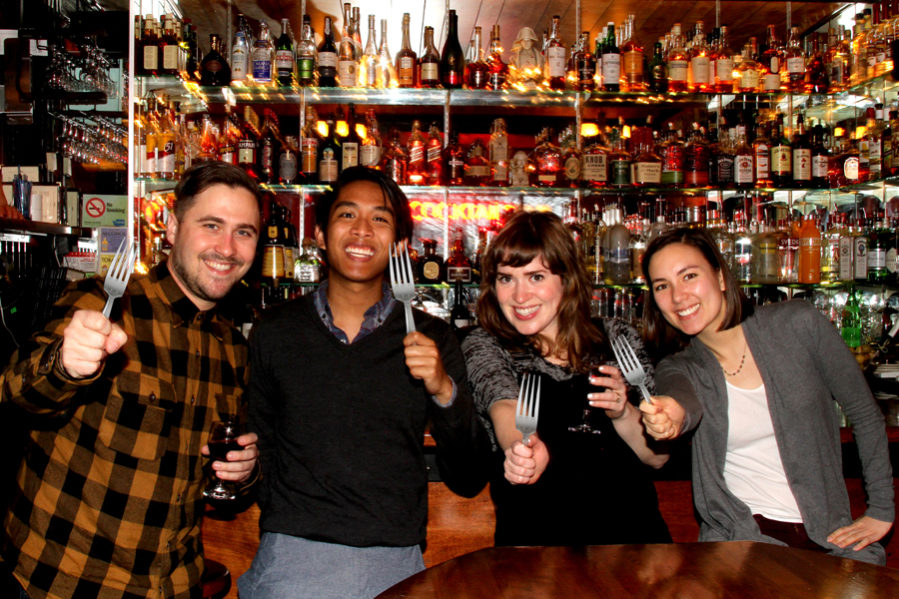Every year, WNCAP submits an “Impact Story” to Dining Out For Life International as a way of illustrating the real-world impact made by the resources raised by Dining Out For Life.
This year’s story, printed below, won an Honorable Mention at the July 2019 Dining Out For Life Impact Awards.
The following story uses a composite character, “Larry”. Each part of “Larry’s” story is a true event that has happened to one or more of our clients.
Healing the Body and the Soul
The South is a hard place to be living with HIV. There is so much beauty in the rural Appalachian mountains of Western North Carolina where the majority of our clients live. But just as the landscape of mountains, meadows, and rushing rivers seems to have existed since time immemorial, so too does the stigmatizing attitudes ingrained in many of the people who call these small communities here home.
When Larry* approached the Western North Carolina AIDS Project (WNCAP) in 2012, he was a victim of the pervasive stigma and homophobia that characterizes much of our service area. Although he had an idea that he might be living with HIV, he had never been tested before he sheepishly walked into our East Asheville office. Even if there had been places around where he lived that offered HIV testing – which there weren’t – he was too scared that the wagging tongues in his small town would spread the news that Larry was getting tested for HIV, that he was probably “some sort of queer.”
Instead, he drove two hours east to Asheville, and by the time he entered our doors and our hearts, he was quite sick. His viral load had increased to the point where he was living with Stage 3 HIV, also known as AIDS. Our Prevention Educator, Martin*, a man known universally in our community as “The Rubber Man” for his practice, since the mid-1980s, of walking around downtown Asheville handing out condoms, tested Larry and gently broke the news to him that he was, indeed, HIV-positive. There was a lot of tears. Martin hugged Larry and told him that it was okay, that HIV is not a death sentence anymore, and that he was loved.
We immediately assigned Larry a case manager, Kevin*, who connected him with medical care right away. Because he was visibly ill, we pulled some strings to get him to see an infectious disease specialist the very next day. The doctor prescribed a course of anti-retroviral therapy and told Larry that if he didn’t stay adherent to his medication, he could die within the year.
The next day, Larry was back at WNCAP, this time seeing our Pharmacy Services Coordinator, Amelia*. Amelia assessed Larry’s financial situation. Unfortunately, even though he was unemployed and had little income, he was not poor enough to qualify for Medicaid in North Carolina. Even so, through a combination of financial assistance and pharmaceutical rebates, Amelia was able to connect Larry with his lifesaving medication at zero cost.
But healing Larry’s body was only the first step. As he continued to meet with Kevin, his case manager, it became clear that Larry was deeply ashamed of his diagnosis and had fallen into major depression as a result. Kevin explained that this was an entirely normal emotional response for people recently diagnosed with HIV and that given Kevin’s upbringing in a conservative Pentecostal family, he had been exposed to a constant barrage of negative attitudes about sex, gay people, and HIV/AIDS. Kevin suggested that Larry attend WNCAP’s biweekly support group for people living with HIV. At first, Larry was hesitant, but when he found out that there was free pizza for group members, he quickly warmed to the idea.
The support group was a revelation for Larry. He told Kevin that he had never met people living with HIV. Not only were these people happy, they were thriving. They openly discussed their status and the challenges they faced living with HIV. One man talked about how his family never accepted him because he was gay. Larry could relate to that. An older woman talked about the medical discrimination she faced from some nurses and doctors when they read her chart and realized she was positive. Larry related to that, too.
One older man in the group, Roger*, fascinated Larry because of how involved he was in advocacy activities. Once a year, WNCAP leads a delegation of staff and clients to Washington, D.C. for a national HIV advocacy conference. The more Roger spoke about this event, called AIDS Watch, the more Larry wanted to go. Finally, in 2016, he got his chance. After a 12 hour car ride to Washington, D.C. Larry was exhausted but prepared. He shared his story in front of Members of Congress and their staff. He talked and laughed with hundreds of other HIV advocates from around the country. He spoke about how his adherence to treatment led to his viral load becoming undetectable, meaning he is unable to transmit HIV sexually.
The resources raised by Dining Out For Life enabled WNCAP to save Larry’s life. But it wasn’t just his body that was returned to him. It was his passion, his sense of self, his purpose. Because of this agency, Larry got his soul back. That’s the impact of Dining Out For Life.
*The names in this story have been changed to preserve anonymity.

